Making it Count: Foster Larson
Posted by: Melissa echo Greenlee on April 24, 2012
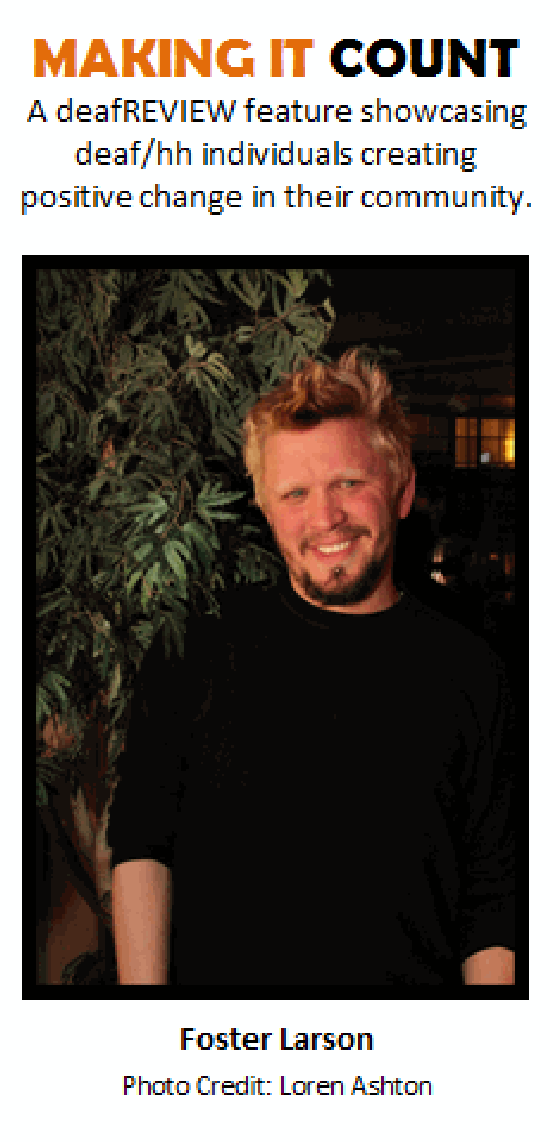
ASL classes at The Elite bring laughter, lessons and colorful nightlife to the Seattle public. Mother Nature is no match for the two-punch appeal of nightlife and sign language in Seattle. This winter’s “Snowmaggeddon” deterred many souls from driving – but didn’t stop 30 students from showing up at The Elite to learn ASL.
It’s a Tuesday, and hands are flying. Along with co-teacher Christian Eisele, teacher Foster Larson sprawls a deck of cards face-down on a table. The signing games begin.
When a student draws a queen, everyone takes turns making up facial expressions. When someone draws a five, it’s “hand jive” - students must create a sign that shares the same minimal pair of the person beside them. The sign for “mom” becomes “grandma,” and in zanier instances, “vomit” becomes “old.” The class roars in laughter when, stumped, one student sheepishly signs the only logical solution: “Diarrhea.
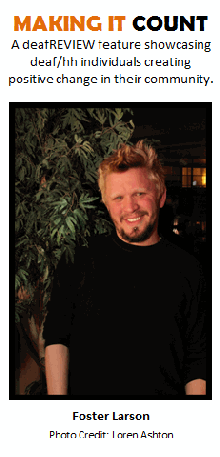 "Other cards incorporate classifiers, ABCs, and finger spelling celebrity names like Bradley Cooper. When a student draws a Jack, it’s a cue to drink. Some sip the bar’s famously stiff drinks, ranging from “Godfather” to “Zoolander”. Others opt for water.
"Other cards incorporate classifiers, ABCs, and finger spelling celebrity names like Bradley Cooper. When a student draws a Jack, it’s a cue to drink. Some sip the bar’s famously stiff drinks, ranging from “Godfather” to “Zoolander”. Others opt for water.
Equal opportunity drinking is to be had, and equal opportunity learning as well. To cater to diverse levels, The Elite’s classes are split into beginner and advanced classes.
Born hearing, Foster became deaf at almost 2 years of age. He has volunteered as a teacher for the Elite class for more than 2 and half years. Mainstreamed in public schools until he was nine, he began learning ASL at the Minnesota State Academy for the Deaf. Eisele, his fiancé, teaches the advanced class, and together they brainstorm lesson plans that infuse humor and engage even the shyest (or most finger-tied) of students.
“I’ve had to pick up the (teaching) skill as I go along, but the students' patience as well as my flexibility have made this experience positive for everyone,” Larson said.
“Overall, each class depends on the students who show up and what they want to learn,” he said. “Most focus on an introduction to ASL as a language, and eventually progress to ASL storytelling, Deaf culture and history, and more complicated ASL grammar.”
On average, 15 to 30 students attend every Tuesday. 50 students once crammed into the class, signifying that deaf culture is alive and well in Seattle. A former SSP (support service provider) for the deaf-blind, Larson gives presentations about deaf-blind experience and interpreting as a profession. He also hosts “voices-off” social events.
It’s all about keeping the class fun, but challenging. That includes bringing Romeo and Juliet to life.
“We're going to be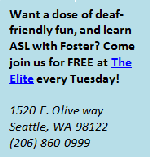 doing Shakespeare,” announces Eisele after the class splits into beginner and advanced sections. “It's hard, good luck.”
doing Shakespeare,” announces Eisele after the class splits into beginner and advanced sections. “It's hard, good luck.”
“But FUN!” signed student Heather Chambers, conveying enthusiasm with large hand movements. She’s part of the advanced group, which is tackling Scene One. They wrack their brains translating arcane phrases like “a dog of the house of Montague moves me” into ASL, using name signs for Mercutio, Romeo, Benvolio, and Juliet.
Eisele, who is hearing, reminds them to integrate ASL’s rules of hand shape, palm orientation, movement, location, and facial expressions: “Part of ASL poetry is seeing similar hand shapes and seeing familiar facial expressions.”
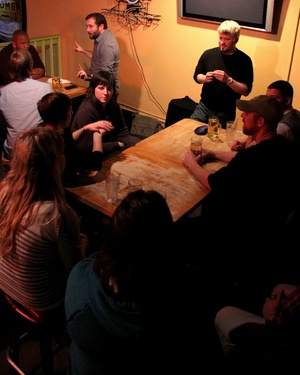
“The group develops their own interpretation – I facilitate it, but I don’t control it,” explains Eisele. That means no one has to go home with Shakespeare. “Can you imagine? No homework.”
After all, the class is often attended as a complement to ASL programs at nearby Seattle Central Community College or Bellevue College. Diana Cardiff goes to shake the rust off after a hiatus from taking six levels of ASL a few years ago. Students who have had to forgo official ASL classes for financial reasons or work-related time constraints, often cite The Elite classes as an alternative.
Some students, such as Kris Hopkins, Kristin Deverin, and Paula Furia, volunteer as voice and ASL interpreters for the class.
The class is an example of how The Elite walks the talk of community involvement. During the summer of 2009, Elite manager Kay Hansen saw an opportunity to create an educational outlet by continuing a weekly series of ASL classes that was previously held (but discontinued) at another Capitol Hill bar.
“Seattle has a huge Deaf community, and this class is a means of access and communication,” says Hansen. In a nod to the bar’s status as a deaf-friendly destination, she adds: “Even all of our bartenders and staff need to know ASL.”
How fluent are they?
“We try our best,” Hansen says, laughing. She noted that about 10 to 12 deaf patrons have become “regulars” at The Elite.
Larson has hosted a special staff-only class, introducing basic ASL such as fingerspelling and beginner bar vocabulary, as well as pointers on being culturally apropos with Deaf customers.
“It’s easy for any bartender t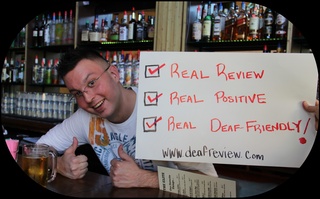 o ignore a deaf person and have hearing friends communicate for him/her instead,” said Eisele. “The (Elite) staff is professional – even if they have to write words down on paper, they do it.”
o ignore a deaf person and have hearing friends communicate for him/her instead,” said Eisele. “The (Elite) staff is professional – even if they have to write words down on paper, they do it.”
As the sign at The Elite’s door reads, aptly, “Enter as strangers, leave as friends.” The Elite classes make this mantra a reality. Across the city, students are able to use differing levels of ASL to serve deaf patrons at work, or at play. Above all, the ASL lessons serve as icebreakers between the deaf and hearing, forging much-needed clarity, many friendships and sometimes even love!
Know someone deaf/hh making a difference in their community? We want to hear about them! Send us an e-mail and tell us all about it.
Tags
- deaf
- hard of hearing
- deaf blind
- deaf friendly
- foster larson
- american sign language
- asl
- asl classes
- elite
- purr
- bar
- seattle
- seattle nightlife


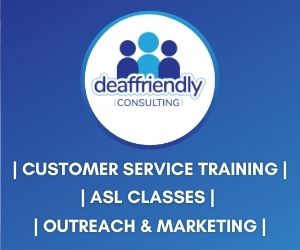

Comments